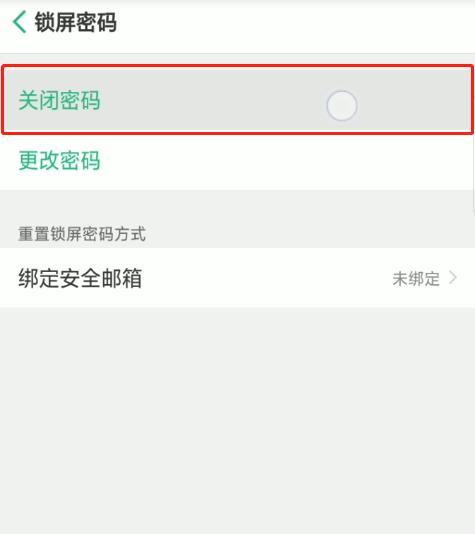 Mobile Tutorial
Mobile Tutorial
 Android Phone
Android Phone
 How to cancel the encryption of OPPO mobile applications (how to cancel the encryption of OPPO mobile applications, free up memory space and improve running speed)
How to cancel the encryption of OPPO mobile applications (how to cancel the encryption of OPPO mobile applications, free up memory space and improve running speed)
How to cancel the encryption of OPPO mobile applications (how to cancel the encryption of OPPO mobile applications, free up memory space and improve running speed)
For users of OPPO mobile phones, application encryption is a common feature. Although encryption can protect the security of application data, it sometimes also brings some limitations to the running speed and memory space of the phone. If you want to cancel the encryption of applications on your OPPO phone to improve running speed and free up more memory space, this article will introduce you to the specific cancellation method. As a new php editor, I will give you detailed answers to help you better use your OPPO phone.

1. Understand the role of OPPO mobile application encryption

Ensure the security of users’ personal information by encrypting the application Encryption protection, OPPO mobile application encryption is a security feature.
2. Understand the impact of canceling the encryption of OPPO mobile applications
It may increase the risk of personal information being stolen. Canceling the encryption of OPPO mobile applications will cause the application to no longer be protected by encryption.

3. Back up important data and applications
to prevent data loss. Before canceling the encryption of OPPO mobile applications, it is recommended to perform the encryption on important data and applications first. Backup.
4. Enter the OPPO mobile phone settings interface
Find the "Settings" icon on the OPPO mobile phone home screen and click to enter the settings interface.
5. Find the "Security" option
Slide to find the "Security" option in the settings interface and click to enter the security settings.
6. Cancel the application encryption password
Find it, click "Application Encryption" in the security settings interface and enter the application encryption password option.
7. Find the application that needs to be decrypted
and click to enter the encryption settings of the application. Find the application that needs to be decrypted in the application encryption interface.
8. Cancel the application encryption function
Find, "Cancel Encryption" in the application encryption settings interface and confirm the option to cancel the encryption function of the application.
9. Repeat steps 7 and 8
Repeat steps 7 and 8 if there are multiple applications that need to be decrypted.
10. Restart the phone
It is recommended to restart the OPPO phone to make the settings take effect, after completing the encryption cancellation operation for all applications.
11. Check the application encryption status
Re-enter the "Application Encryption" interface to check whether the unencrypted application has been unencrypted.
12. Clean cache and junk files
Find "Storage Space" in the OPPO phone settings interface to release more storage space, clean cache and junk files, options.
13. Monitor mobile phone performance changes
You can monitor whether the running speed of the phone has improved, whether the encryption of OPPO mobile applications has been cancelled, and whether the storage space has been released.
14. Pay attention to the security of personal information
Please ensure the implementation of other security measures to prevent personal information from being leaked. Canceling the encryption of OPPO mobile applications will reduce the security of personal information.
15.
And free up more storage space, users can cancel OPPO mobile application encryption and improve the running speed of the phone through the operation methods in this article. It is necessary to pay attention to the security of personal information and perform backup operations, however, during the process of canceling encryption.
The above is the detailed content of How to cancel the encryption of OPPO mobile applications (how to cancel the encryption of OPPO mobile applications, free up memory space and improve running speed). For more information, please follow other related articles on the PHP Chinese website!

Hot AI Tools

Undresser.AI Undress
AI-powered app for creating realistic nude photos

AI Clothes Remover
Online AI tool for removing clothes from photos.

Undress AI Tool
Undress images for free

Clothoff.io
AI clothes remover

Video Face Swap
Swap faces in any video effortlessly with our completely free AI face swap tool!

Hot Article

Hot Tools

Notepad++7.3.1
Easy-to-use and free code editor

SublimeText3 Chinese version
Chinese version, very easy to use

Zend Studio 13.0.1
Powerful PHP integrated development environment

Dreamweaver CS6
Visual web development tools

SublimeText3 Mac version
God-level code editing software (SublimeText3)

Hot Topics
 1386
1386
 52
52
 How to use sql datetime
Apr 09, 2025 pm 06:09 PM
How to use sql datetime
Apr 09, 2025 pm 06:09 PM
The DATETIME data type is used to store high-precision date and time information, ranging from 0001-01-01 00:00:00 to 9999-12-31 23:59:59.99999999, and the syntax is DATETIME(precision), where precision specifies the accuracy after the decimal point (0-7), and the default is 3. It supports sorting, calculation, and time zone conversion functions, but needs to be aware of potential issues when converting precision, range and time zones.
 How to create oracle database How to create oracle database
Apr 11, 2025 pm 02:36 PM
How to create oracle database How to create oracle database
Apr 11, 2025 pm 02:36 PM
To create an Oracle database, the common method is to use the dbca graphical tool. The steps are as follows: 1. Use the dbca tool to set the dbName to specify the database name; 2. Set sysPassword and systemPassword to strong passwords; 3. Set characterSet and nationalCharacterSet to AL32UTF8; 4. Set memorySize and tablespaceSize to adjust according to actual needs; 5. Specify the logFile path. Advanced methods are created manually using SQL commands, but are more complex and prone to errors. Pay attention to password strength, character set selection, tablespace size and memory
 How to delete rows that meet certain criteria in SQL
Apr 09, 2025 pm 12:24 PM
How to delete rows that meet certain criteria in SQL
Apr 09, 2025 pm 12:24 PM
Use the DELETE statement to delete data from the database and specify the deletion criteria through the WHERE clause. Example syntax: DELETE FROM table_name WHERE condition; Note: Back up data before performing a DELETE operation, verify statements in the test environment, use the LIMIT clause to limit the number of deleted rows, carefully check the WHERE clause to avoid misdeletion, and use indexes to optimize the deletion efficiency of large tables.
 How to delete all data from oracle
Apr 11, 2025 pm 08:36 PM
How to delete all data from oracle
Apr 11, 2025 pm 08:36 PM
Deleting all data in Oracle requires the following steps: 1. Establish a connection; 2. Disable foreign key constraints; 3. Delete table data; 4. Submit transactions; 5. Enable foreign key constraints (optional). Be sure to back up the database before execution to prevent data loss.
 How to add columns in PostgreSQL?
Apr 09, 2025 pm 12:36 PM
How to add columns in PostgreSQL?
Apr 09, 2025 pm 12:36 PM
PostgreSQL The method to add columns is to use the ALTER TABLE command and consider the following details: Data type: Select the type that is suitable for the new column to store data, such as INT or VARCHAR. Default: Specify the default value of the new column through the DEFAULT keyword, avoiding the value of NULL. Constraints: Add NOT NULL, UNIQUE, or CHECK constraints as needed. Concurrent operations: Use transactions or other concurrency control mechanisms to handle lock conflicts when adding columns.
 What are the oracle11g database migration tools?
Apr 11, 2025 pm 03:36 PM
What are the oracle11g database migration tools?
Apr 11, 2025 pm 03:36 PM
How to choose Oracle 11g migration tool? Determine the migration target and determine the tool requirements. Mainstream tool classification: Oracle's own tools (expdp/impdp) third-party tools (GoldenGate, DataStage) cloud platform services (such as AWS, Azure) to select tools that are suitable for project size and complexity. FAQs and Debugging: Network Problems Permissions Data Consistency Issues Insufficient Space Optimization and Best Practices: Parallel Processing Data Compression Incremental Migration Test
 Centos stops maintenance 2024
Apr 14, 2025 pm 08:39 PM
Centos stops maintenance 2024
Apr 14, 2025 pm 08:39 PM
CentOS will be shut down in 2024 because its upstream distribution, RHEL 8, has been shut down. This shutdown will affect the CentOS 8 system, preventing it from continuing to receive updates. Users should plan for migration, and recommended options include CentOS Stream, AlmaLinux, and Rocky Linux to keep the system safe and stable.
 How to add multiple new columns in SQL
Apr 09, 2025 pm 02:42 PM
How to add multiple new columns in SQL
Apr 09, 2025 pm 02:42 PM
Methods to add multiple new columns in SQL include: Using the ALTER TABLE statement: ALTER TABLE table_name ADD column1 data_type, ADD column2 data_type, ...; Using the CREATE TABLE statement: CREATE TABLE new_table AS SELECT column1, column2, ..., columnn FROM existing_table UNION ALL SELECT NULL, NULL, ..., NUL



